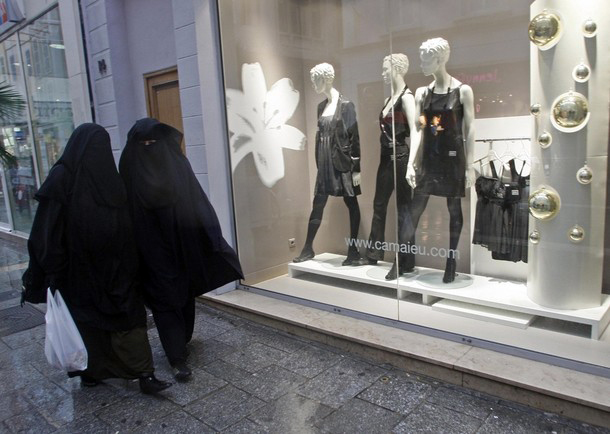
When Henry Kissinger asked then-Chinese Premier Zhou Enlai for his assessment of the French Revolution, the Chinese leader reportedly responded, “It is too early to tell.” This exchange became famous more for its revelations about China’s psyche and historical perspective than for its piercing analysis of the legacy of 1789. But just as Premier Zhou predicted, the French Revolution remains unfinished business. France’s current debate over the right of women to wear the burqua in public places demonstrates that the country’s long struggle between secular republicanism and religious fundamentalism lives on.
The American media have reported on France’s attempts to legislate the burqua with a combination of confusion and bemusement. Editorials in American newspapers complain loudly that the proposal by a French parliamentary committee to ban the burqua from the public sphere would be an intolerable affront to individual liberties. This viewpoint is understandable from an American perspective, where the rights of the individual are an inviolable legacy of the American Revolution enshrined in the Bill of Rights.
Unfortunately, American editorial boards fail to take into account how the drama of post-Revolutionary France shapes the debate over current social issues in France. American analysts mostly view Nicolas Sarkozy’s efforts to launch a dialogue on national identity and outlaw the burqua as an attempt to siphon off voters from the far right to his UMP party prior to potentially perilous regional elections in March. Other commentators reasonably point out that the effort to outlaw the burqua is a byproduct of France’s growing unease over its failure to successfully integrate the country’s large Muslim population, which is increasingly comprised of first and second-generation French citizens. And nearly all who oppose a ban on the burqua predict that the law will further alienate France’s Muslims and further retard the integration process.
There are elements of the truth in each of the points raised above. Nevertheless, they miss the real issue. The French Parliament’s controversial proposal to outlaw the burqua exists in an important political, social, and historical context. The burqua has become a lightning rod in France not because of a reflexive anti-Muslim bias or as a political ploy, but because it so conspicuously flies in the face of the values of the French Republic, immortalized by its motto: ”Liberty, Equality, Fraternity."
The burqua challenges western conceptions of liberty and equality by trampling on women’s rights, one of the most important social gains in post-war Western Europe. The burqua also defies the somewhat ambiguous French concept of fraternity, which implies a form of community and togetherness in the face of deep political, social, and regional differences that divided France throughout its turbulent history. Women who wear the burqua in France choose to stand apart not only from non-Muslim women, but also to distinguish themselves from their less conservative co-religionists. By suppressing all forms of individual expression except extreme personal piety, the wearer of the burqua in France separates herself from French society and conspicuously rejects of the notion of assimilation and adherence to the values of the officially secular republic to which she has chosen to immigrate.
Perhaps most misunderstood is France’s tradition of state secularism and the ways in which the country’s post-revolutionary history shaped the state’s determination to ensure secularism in the public realm. Throughout the nineteenth century, conservative Catholics resisted the spread of the Revolution and its tenets of secularism and republicanism, supporting monarchist and reactionary causes and figures. The secular republicans ultimately emerged as the political victors by officially separating the church and state in 1905, and the forces of anti-secularism terminally discredited themselves by siding with the Vichy regime in World War II.
Nevertheless, the historical legacy of this century-long conflict between clericalism and secularism is a deep-seated determination to keep the influence of religion out of public places. In a French cultural context, the right of the citizen to be free from religion in the public sphere supersedes the right of the individual to self-expression. The 1905 law separating church and state is a milestone moment in the history of France its revolutionary heritage, and the law guides and informs the discussion on the role of religion in France today.
Pundits will fail to understand the nature of France’s tortured and somewhat awkward debate on the role of Islam in contemporary society without stepping back to look at the larger historical perspective. It is far too easy to dismiss the current controversy as a cynical, short-term political ploy or the xenophobic reflex of a society famous for jealously guarding its cultural and societal traditions. As the nation becomes increasingly diverse and France and its minorities negotiate the limits of acceptable social behavior, the legacy of the French Revolution and its values will continue to shape and define the country’s social and political landscape. As Zhou Enlai suggested decades ago, it is still too soon to know what to make of 1789.
Jeff Lightfoot is associate director of the International Security Program at the Atlantic Council. Reuters Pictures.
Image: Marseille.jpg
